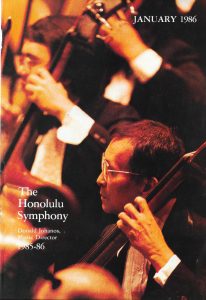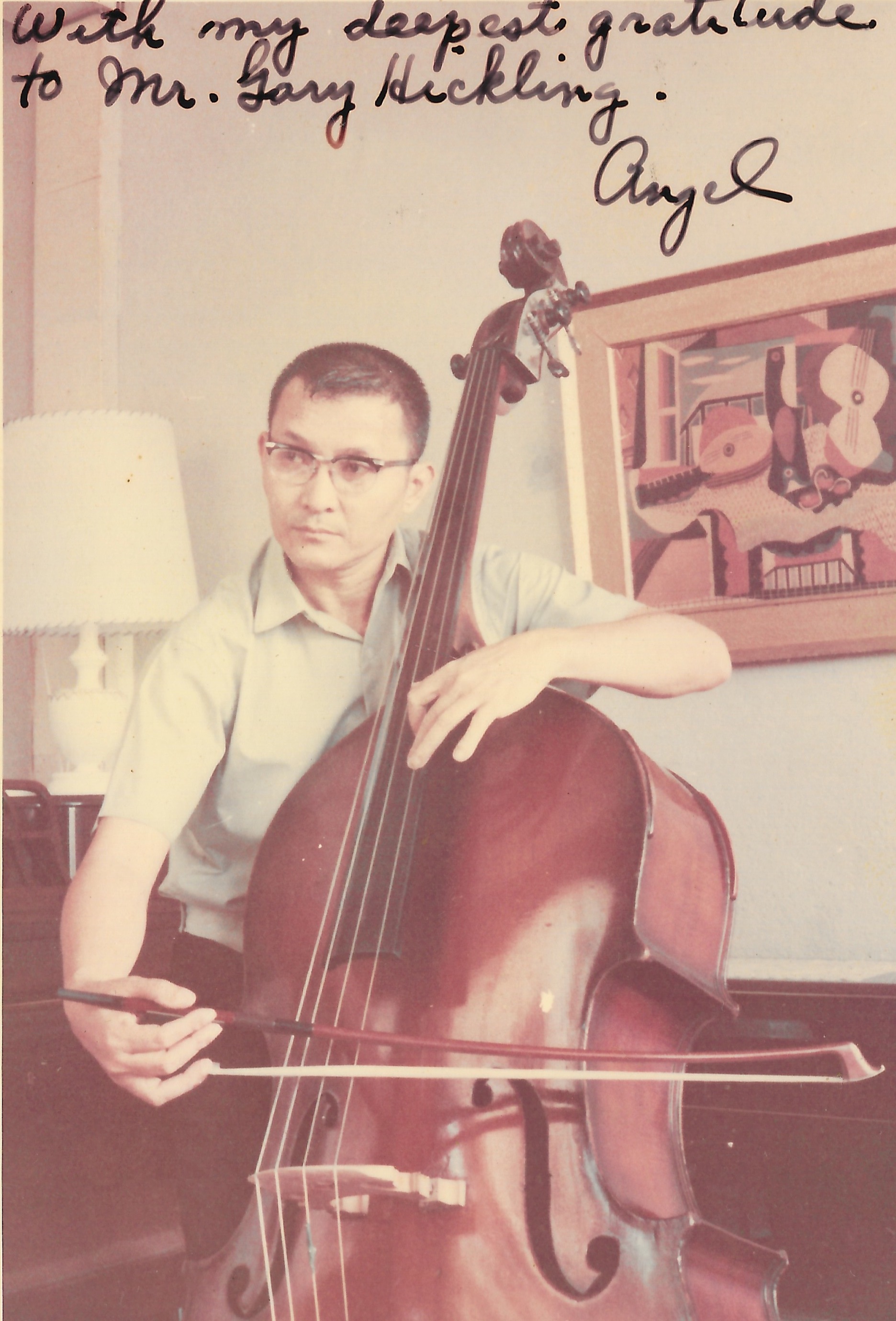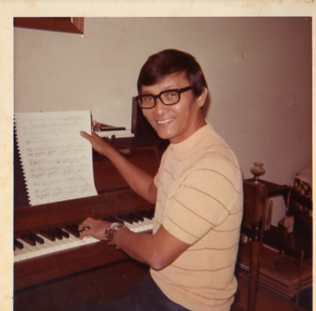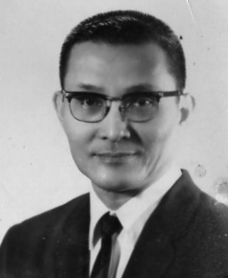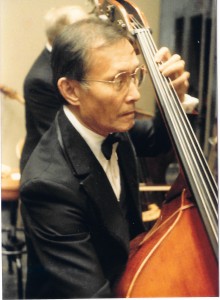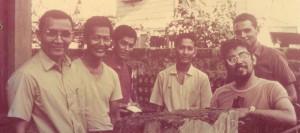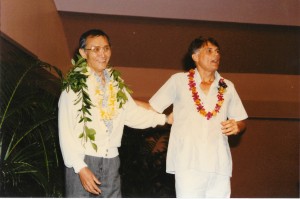This page is devoted to the Filipino composer and bassist, Angel Peña. He passed away 22 December 2014. You will find a bio on Mr. Peña at the bottom of this page.
Angel’s daughter, Irma sent the following information:
“The University of the Philippines College of Music now houses Dad’s works. The contact for his collection is: Ms. Josephine L. Baradas, Admin & University Researcher. I officially donated them to the College through the Dean and Ms. Baradas some 8 years ago. Her email address is jlbaradas@up.edu.ph, website https://music.upd.edu.ph/Administration.html “
The solo bass works that Mr. Peña wrote can be demanding, but satisfying. As I aged and couldn’t play his most challenging works, such as the Bass Concerto and the two sonatas, I asked him to write something a bit easier. That resulted in a wonderful work that he called “Four Pieces for Double Bass and Piano” that you can find below. Both the bass and piano parts are easy to master and enjoy.
Click here to see a downloadable PDF of Angel’s Bass Sonata #2.
Click here to see a downloadable PDF of Angel’s “Four Pieces for Double Bass and Piano.”
When I arrived in Manila to teach bass in 1966, Angel and his family were in Hong Kong, where he was playing in jazz groups. He did me the signal honor of returning to study with me.
During that year he devotedly studied classical double bass and shortly after I left, auditioned for the Honolulu Symphony Orchestra, winning a permanent position in that orchestra. When I joined the HSO in 1983 he was still there and it was a pleasure to be reunited with this former “student,” now colleague. We remained close throughout those years, until he left Honolulu.
He wrote many wonderful pieces for bass and this is your chance to hear them.
I performed the following Angel Peña works on a recital I gave at the University of Hawaii’s Orvis Auditorium. It was dedicated to Mr. Peña. Marion McKay is the pianist.
Here is the First Sonata, written in 1970.
Pena/FirstSonata/1stMvt (Grave/Legiero)
Pena/FirstSonata/2ndMvt (Adagio)
Pena/FirstSonata/3rdMvt (Allegretto/Legiero)
The Concerto (played on that same recital) was written while I was still in Manila (1967).
Pena/Concerto/1stMvt (Allegro Moderato/Animato)
Pena/Concerto/2ndMvt (Adagio)
Pena/Concerto/3rdMvt (Allegro)
The old color photo shows Angel (left), as we visited luthiers (one next to Angel and the other next to me. The man in the middle is probably another student of mine, Peping Calderon Jr. In front of me is another “student” (a very advanced player, like Angel) Johnny Gosalvez.
Mr. Peña wrote the second sonata in 1992, with an alternate orchestra accompaniment. This means, it can also be played as a concerto. The following performance is from the Orvis Auditorium recital that Marion and I played.
Pena/2ndSonata/1stMvt (Andante)
Pena/2ndSonata/2ndMvt (Elegy, Poco Adagio)
Pena/2ndSonata/3rdMvt (Vivace)
Angel wrote the Trio (Suite for Three Double Basses) for specific performers. That explains the subtitle: A-G-E (Angel, Gary, Ed). But in this case, Mark Kuraya, Tracy Rosenkranz and I played it. The photo of Angel and me was taken at the Orvis Auditorium recital dedicated to Mr. Peña and some of his beautiful bass music. The occasion was his announced intention to leave Hawaii.
Pena/Trio/1stMvt (Andante)
Pena/Trio/2ndMvt (Promenade)
Pena/Trio/3rdMvt (Bolero:Allegro Moderato)
Pena/Trio4thMvt (Buffo:Moderato
Luckily, I have a copy of Mr. Peña’s own performance of his concerto with the Manila Symphony Orchestra.
Angel Plays His Concerto/1stMvt
Angel Plays His Concerto/2ndMvt
Angel Plays His Concerto/3rdMvt
And finally, here is Mr. Peña playing his Concerto with piano accompaniment, strangely missing just the ending.
Angel Plays Peña Concerto/1stMvt/PianoAcc.
Bio
Angel Matias Peña (April 22, 1921 – December 22, 2014) is a Filipino classical and jazz composer, arranger, and bass player. He is widely considered by modern Filipino jazz musicians as “one of the founders of traditional jazz in the Philippines.” He was born in Laoag, Ilocos Norte, Philippines, to a family of musicians — his father, Gregorio Cid Peña, studied violin at the UP; his mother, Rosario Velarde Matias, studied voice and piano at the same school, and also taught Angel solfeggio; his grandfather played guitar; and his uncles were professional violinists. He took up but did not finish music at the CEU Conservatory of Music under L.T. Sacramento. Peña was also a student of Antonio Molina who taught him composition, harmony, counterpoint, and orchestration. He composed various compositions during his teenage years, writing a handful of kundimans for the women he would be courting. He also wrote down his first original jazz composition just before the Second World War broke out. Tirso Cruz noticed his talent and made him a musician and arranger for the Shanghai Club Orchestra. Peña also became an arranger for the Special Services division of the US Army, Villar Recording, the Sky Room, and was also musical director for movies.
He received a certificate of merit in double-bass playing under a grant (with Gary Hickling as his mentor) and a Licentiate from the Royal Schools of Music, London. He has arranged various jazz concerts for the Upsilon Sigma Phi at the University of the Philippines. He worked as the dance band leader at the Hong Kong Hilton for a time and conducted lecture-demonstrations, among others at the Thomas Jefferson Library in Manila in 1968, and at the University of Hawaii in 1975. Angel Peña won two first prizes at the Philippine National Compositions Contests. He also received a plaque from the Order of Knights of Rizal for his composition, Homage to Rizal. He has three long playing records of original compositions released in Manila, the United States and Germany. Angel Peña is affiliated with the Performing Rights Society Ltd of London, the United Kingdom Song Writers Guild of Great Britain, the American String Teachers’ Association, the Musicians Association of Hawaii, and the Audition Committee of the Honolulu Symphony Orchestra.
Among his compositions for orchestral music are Igorot Rhapsody (1958), Concerto for Double Bass and Orchestra (1969), Concerto for Jazz Quartet and Orchestra (1981) and Symphonic Variations on Two Manobo Themes (1983). He has also composed chamber music works. He also wrote musical scores for film companies, most notably LVN Pictures. His most popular kundiman is “Iyo Kailan Pa Man” with words by Levi Celerio. He wrote many works for solo bass, his instrument.
